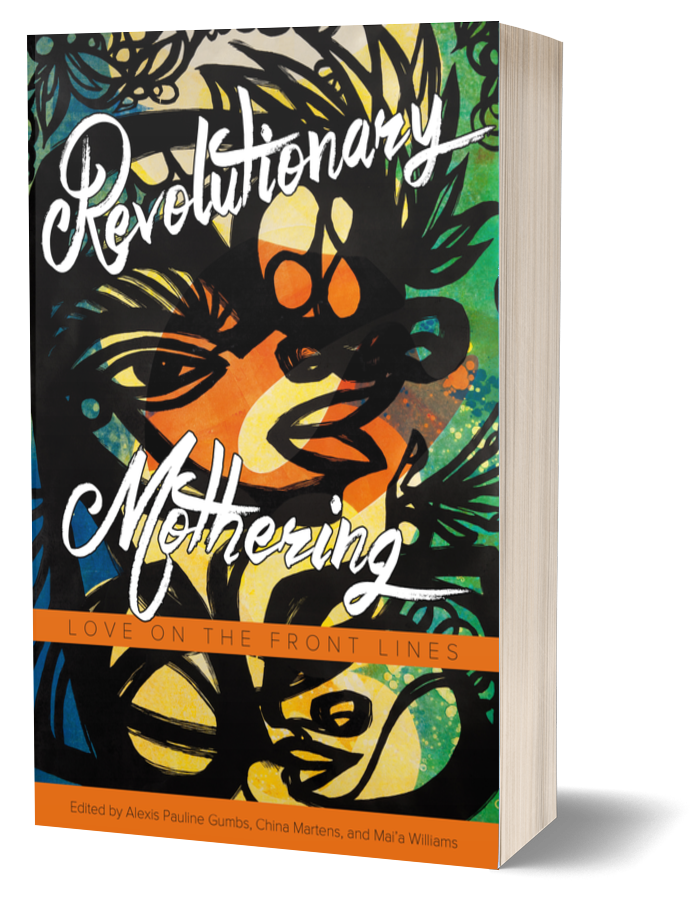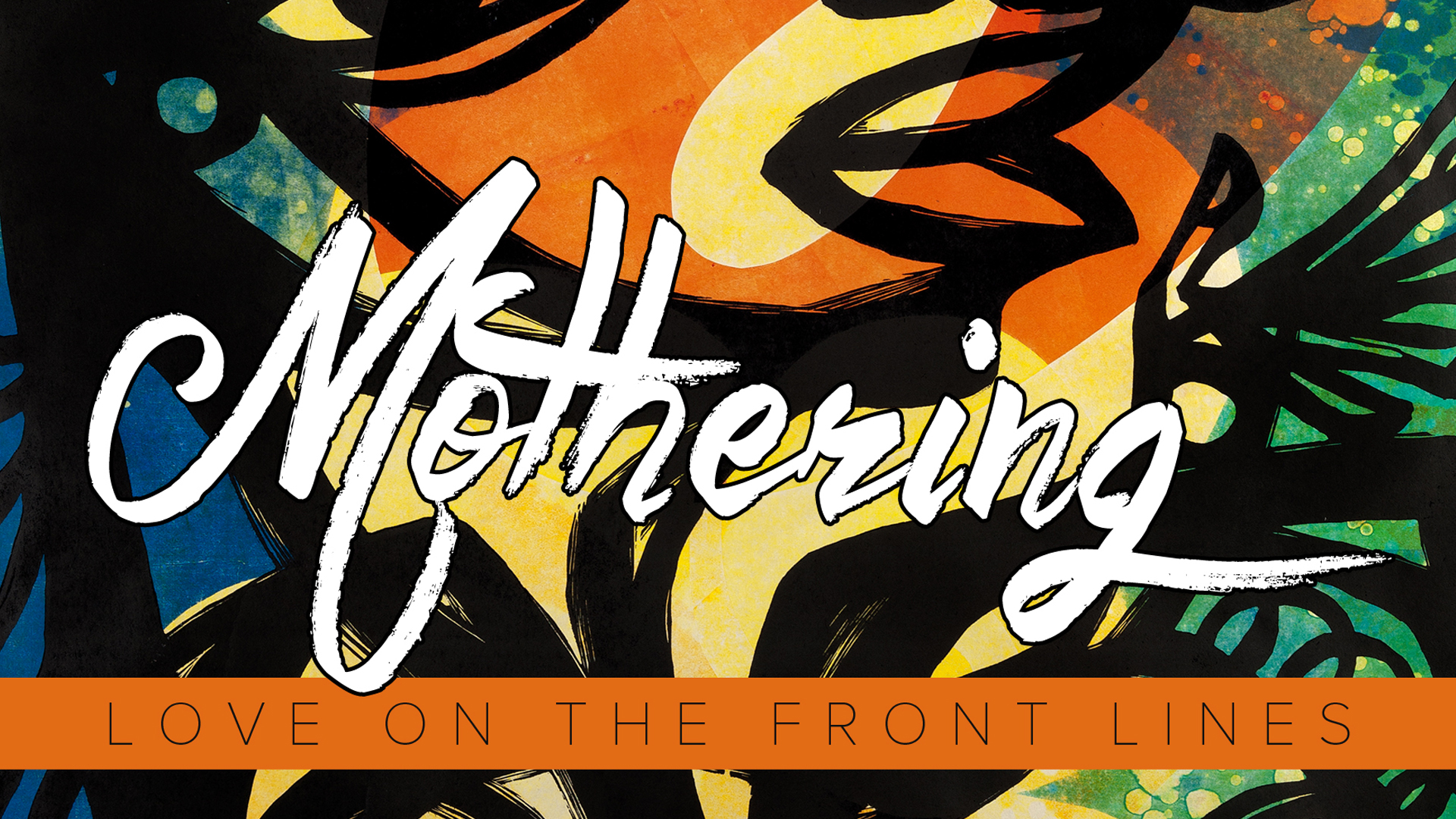By Kimberly Lee
Literary Mama
March/April 2021
The list of ingredients required to make my cousin’s coveted gumbo is a long one: shrimp, andouille sausage, Dungeness crab, chicken wings, hot links, tomato paste, chicken stock, filé powder. He prepares it by first focusing his attention on the broth, adding the proteins after they are sautéed. Each item retains its own distinct flavor yet melds with the other ingredients into a complex and sumptuous whole, rendering the palate at once delighted and satisfied.
The same can be said of Revolutionary Mothering: Love on the Front Lines, an anthology of essays, letters, and ideas expressed through hybrid and experimental forms. Recognizing the need for diverse perspectives of motherhood, editors Alexis Pauline Gumbs, China Martens, and Mai’a Williams center the experiences of mothers of color and other marginalized mothers, including those who are disabled, single, queer, teenagers, and low-income. Although the writers emerge from widely different backgrounds, their voices come together in an alchemy of the written word, embodying creativity, resourcefulness, and strength as they raise children in a world that can be hostile simply because of their identity. As such, the book serves as both an ode to motherhood as well as an invitation to become immersed in the lived experience of each writer.
Published shortly after the inception of Black Lives Matter, Revolutionary Mothering now finds itself in a particularly timely position, as the nation undergoes a renewed awakening to long-standing matters of racial disparity and systemic discrimination. Certain passages seem almost prophetic, as the world rebounds from a global pandemic. In “Motherhood, Media, and Building a 21st-Century Movement,” Malkia A. Cyril writes “Right now, mothers across this nation, and across the world are deciding how best to educate their children, and they are increasingly using digital technologies and mobile platforms to do it.” Acknowledging the integral role mothers face, she states “It is mothers who will shape the engagement strategies and activation point of the next generation. . . [and they] will decide. . . what future 21st-century social movement creates.”
As this passage indicates, the volume investigates the concept of revolutionary mothering, seeking to define it while at the same time realizing that the very nature of it defies strict definitions. The result is a collection of writing that is inclusive and expansive, chronicling motherhood as a channel through which to address broad social issues while remaining deeply rooted in the day-to-day tasks and routines that mothers handle. This convergence keenly illustrates the connection between larger, societal issues and individual lives. “The world shows itself in full color the first night you become a parent,” writes former Literary Mama editor Lisa Factora-Borchers in “Birthing A New Feminism,” her contribution to the anthology. “You begin to yearn for the impossible: guarantees of safety and justice. . . . I suddenly had this crazy urge to clean up the world for my son.”
Many of the featured writers are social activists, deeply engaged in civic work. In “Doing It All…and Then Again With Child,” Victoria Law shares how motherhood transformed her involvement in social activism from attending demonstrations and meetings on fair housing to a project showcasing the writing of women in prison. “I began to see words. . . as valuable educational tools. . . that I could wield while still pushing a stroller to the playground.” Esteli Juarez advocates for women’s control over their own bodies, as she describes in “Choice,” a piece that addresses the forcible sterilization of disabled women in the 1930s and women of color in the 1970s. tk karakashian tunchez’s manifesta “Telling Our Truths to Live” declares her commitment to education and community exchange as forces in the cause for liberation.
Some contributors are powerfully activated within the world of their own families, parenting in a way that instills a sense of community and leads to the creation of a more just environment. Ariel Gore, in “Queering Family,” seeks a broader definition of mothering that acknowledges and uplifts all families, no matter their makeup, origin, or incarnation. Terri Nilliasca’s essay “Night Terrors, Love, Brokenness, Race, Home & the Perils of the Adoption Industry” documents her journey within the bureaucracy of adoption, and in “Birthing My Goddess,” H. Bindy K. Kang refuses the influence of extended family and others in her community who exhibit gender preference with respect to the child she’s expecting. Claire Barrera shares her experience of mothering with a disability and chronic pain, letting go of artificial ideals, and creatively reimagining a successful family life. “We can use the stroller instead of the sling and still enjoy our walk,” she writes. “We can play in the pool instead of the park. . . .” These pieces push against societally-imposed boundaries and notions of which experiences of motherhood are to be valued, cherished, and held high.
The writing of other mothers in the collection serves as a device for reclaiming agency and renewed fortitude in the face of oppression, isolation, or external attempts at silencing their voices. In “You Look Too Young to be a Mom,” Lindsey Campbell recognizes teenagers who proudly mother with a combination of joy, pride, and thick skin. “Love Balm for my Spirit Child” describes an elegiac workshop and healing performance piece created by Arielle Julia Brown for mothers who have lost children to police brutality and systematic violence. These memories provide the impetus for women who have suffered traumatic loss to join the fight for justice and change. In “Scarcity Thinking,” Autumn Brown embraces the appreciation of abundance as a way to teach her children lessons of collaboration, in line with her values. Mothering her “own creativity into being” is a crucial part of Irene Lara’s approach to revolutionary mothering, discussed in “From the Four Directions.” Expressing herself freely, via untethered emotion and unfettered truth, is the highest example she can set for her children.
Some writers break the fourth wall, directly addressing the reader, transforming the volume from its existence as a treatise on motherhood to an interactive conversation, one in which the creators become three-dimensional. “We can’t wait to be with you, in your in-between moments with your crumbs and fingerprints,” write the editors as they explain the organization of the book. “Bless these pages with your traces and attention. . . . We are so glad that you are here.” Malkia A. Cyril asserts, “My mother was beautiful, brilliant, powerful. And whether you are a teacher, a doctor, unemployed, a sex worker, or a prisoner, so are you. I see you. I support you. And I lift your voice, and sing.” These statements, revolutionary in and of themselves, acknowledge the worth of all mothers while paying homage to the singular experience each brings to the maternal table.
In her discussion of the power of love and creativity in “The Creative Spirit,” June Jordan acknowledges that motherhood itself, in all its incarnations, is a revolutionary act. “[Y]ou will have trouble finding anything more awesome, and also anything more extraordinarily exhilarating, than the opportunity. . . to nurture a child into his or her own freedom.” The many facets and flavors of motherhood expressed in Revolutionary Mothering offer an insightful narrative of the dynamic context within which mothers exist, where opportunities for grace and growth abound, rendering Lisa Factora-Borchers’ statement quite accurate: “The revolution will not be a movement. It will be Birthed.”

Back to Mai’a Williams Author Page | Back to Alexis Pauline Gumbs’s Author Page | Back to China Marten’s Author Page






